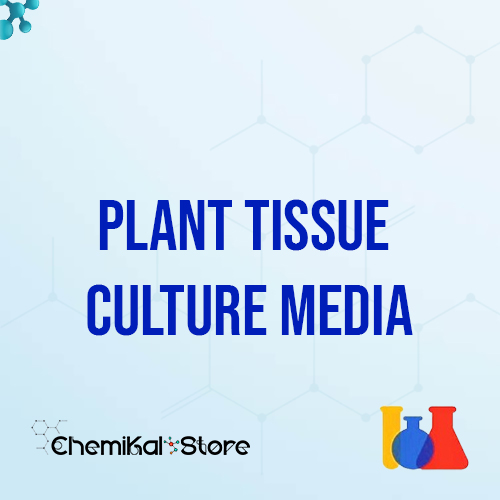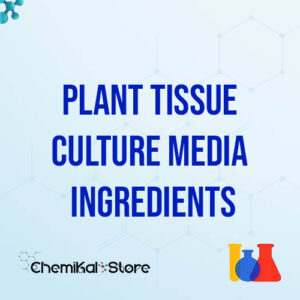Plant Tissue Culture Media
-
High-purity, standardized media for all plant tissue culture applications
-
Wide range: MS, B5, LS, NN, White’s, WPM, QL, and proprietary blends
-
Long shelf life, sustainable packaging, and cost-effective logistics
-
Bulk packaging and prompt India-wide/international delivery
-
COA, MSDS, and full batch traceability with every order
- Estimated Delivery : Up to 8 business days
- Free Shipping & Returns : On all orders over ₹1000
Buy Plant Tissue Culture Media Online – High-Quality Media for Micropropagation, Research, and Commercial Production
The basis of modern plant bio-technology is represented by plant tissue culture media, which allows the rapid and disease free, and large scale multiplication, of elite plant varieties. When you order plant tissue culture media over the internet, you are provided with accurate, high purity and reproducible formulations that are supporting each step of the in vitro plant growth cycle; callus induction and rooting and acclimatization. Our buy plant tissue culture media online in India service provides you with high quality, laboratory graded media with detailed documentation, reliable supply and timely delivery of the same.
What is Plant Tissue Culture Media?
Plant tissue culture media: are specifically designed integrations of inorganic nutrients, organic supplements, vitamins, plant growth regulators, and gelling agents that give the required environment to aseptic growth and development of plant cells, tissues, or organs in vitro. These media are the support of micropropagation of plants, genetic engineering, conservation of germplasm and plant developmental biology researchers.
Key Components of Plant Tissue Culture Media
-
Macronutrients: Nitrogen, phosphorus, potassium, calcium, magnesium, sulfur (as salts like NH₄NO₃, KNO₃, CaCl₂, MgSO₄, KH₂PO₄)
-
Micronutrients: Iron, manganese, zinc, copper, boron, molybdenum, cobalt, iodine
-
Vitamins: Thiamine (B1), pyridoxine (B6), nicotinic acid (B3), myo-inositol
-
Amino acids and nitrogen sources: Glycine, glutamine, casein hydrolysate
-
Carbohydrates: Sucrose (most common), glucose, maltose
-
Plant Growth Regulators (PGRs): Auxins (IAA, IBA, NAA, 2,4-D), cytokinins (BAP, kinetin, zeatin), gibberellins, abscisic acid, ethylene inhibitors
-
Solidifying agents: Agar, gellan gum, agarose
-
Other additives: Activated charcoal, antibiotics, natural extracts (coconut water, banana powder)
-
Water: Ultra-pure, tissue-culture grade
The composition and concentration of these components are tailored to the plant species, tissue type (explant), and the specific stage of culture (initiation, multiplication, rooting, etc.)
Types of Plant Tissue Culture Media
| Medium | Main Use | Key Features |
|---|---|---|
| Murashige & Skoog (MS) | Universal, organogenesis, regeneration | High macronutrient content, supports most species |
| Gamborg’s B5 | Cell suspension, callus culture | High nitrate, low ammonium, optimized for legumes |
| Linsmaier & Skoog (LS) | Organogenesis, tobacco culture | Modified vitamins, optimized thiamine concentration |
| Nitsch & Nitsch (NN) | Anther culture, pollen culture | High thiamine, biotin, and folic acid |
| White’s Medium | Root culture, shoot culture | Low salt, high MgSO₄, early root culture medium |
| Woody Plant Medium (WPM) | Woody species, trees, ornamentals | Low salt, high Ca²⁺, tailored for woody plants |
| Quoirin & Lepoivre (QL) | Woody plants (apple, peach, almond) | Reduced ammonium, increased calcium, no chlorine |
| Schenk & Hildebrandt (SH) | Callus, cell suspension (tobacco) | High nitrate, balanced micronutrients |
| Custom/Proprietary Media | Specialized applications | Tailored for specific species or phases (e.g., rooting) |
Applications of Plant Tissue Culture Media
Plant tissue culture media are essential for:
-
Micropropagation: Elite disease free plants, which are multiplied in large numbers within a short period.
-
Genetic Engineering: Transformation, gene editing, and regeneration of transgenic plants
-
Germplasm Conservation: In vitro conservation of rare, endangered or useful plant species.
-
Production of Secondary Metabolites: Large-scale cell cultures for pharmaceuticals, flavors, and fragrances
-
Pathogen Elimination: Meristem tip culture for virus-free stock in crops like potato, banana, and sugarcane
-
Embryo Rescue and Hybridization: Culturing: Wide cross wide crosses or interspecies hybrids Embryos.
-
Research: The plant growth, development, stress tolerance and physiology under controlled conditions are researched.
Key Stages and Media in Plant Tissue Culture
-
Initiation/Explant Establishment
-
Surface sterilization of explant (leaf, node, meristem, etc.)
-
Use of general or specialized initiation media (usually MS or LS base)
-
-
Callus Induction
-
High auxin/cytokinin ratio for callus formation (often 2,4-D or NAA plus BAP)
-
MS, B5, or SH media with specific PGRs
-
-
Organogenesis/Shoot Multiplication
-
Balanced or cytokinin-rich media (BAP, kinetin, zeatin)
-
MS, LS, or custom media for shoot proliferation
-
-
Rooting
-
Auxin-rich media (IBA, NAA, IAA)
-
MS or White’s medium, or specialized rooting blends (e.g., Roots™)
-
-
Acclimatization
-
Gradual transfer to soil or substrate, often with reduced sucrose and PGRs
-
Popular Plant Tissue Culture Media Products
| Product Name | Application | Type |
|---|---|---|
| MS Medium | Universal, all stages | General Purpose |
| B5 Medium | Callus, suspension, legumes | Specialized |
| LS Medium | Tobacco, organogenesis | Specialized |
| NN Medium | Anther, pollen culture | Specialized |
| White’s Medium | Root, shoot, callus | General Purpose |
| WPM | Woody plants, trees | Specialized |
| Roots™ Media | Rooting phase | Proprietary |
| Shoots™ Media | Multiplication phase | Proprietary |
| Custom Media | Species-specific, research | Tailored |
Plant Tissue Culture Media Composition and Preparation
Essential Components
-
Basal Salts: Supply of cellular metabolism and growth of cells with macro- and micronutrients.
-
Organic Supplements: Vitamins, amino acids, and sometimes natural extracts to support metabolism and morphogenesis
-
Carbon Source: Sucrose is most common (20–30 g/L), but glucose or maltose may be used
-
Plant Growth Regulators: Auxins for rooting/callus, cytokinins for shoot multiplication, gibberellins for elongation, abscisic acid for dormancy, and ethylene inhibitors as needed
-
Gelling Agent: Agar (6–8 g/L), gellan gum, or agarose for solid media
-
pH Adjustment: Typically 5.6–5.8 before sterilization
Preparation Steps
-
Weigh and dissolve basal salts in ~80% of final water volume (ultra-pure, tissue-culture grade)
-
Add organic supplements, vitamins, and PGRs; dissolve completely.
-
Adjust pH to 5.6–5.8 with 0.1–1M HCl or KOH
-
Add gelling agent (if making solid media); stir and heat gently.
-
Bring to final volume with water; mix thoroughly.
-
Dispense into culture vessels (tubes, jars, flasks, Petri dishes).
-
Sterilize by autoclaving at 121°C for 15–20 minutes at 15 psi
-
Cool and solidify in a sterile environment; store at 2–8°C if not used immediately.
How to Select the Right Plant Tissue Culture Media
-
Start with standard media (MS, B5, LS, White’s) for most species
-
Adjust salt concentration (high, medium, low) to optimize for your explant/species
-
Test different ratios of auxin and cytokinin for shoot/root induction or callus formation
-
Experiment with sucrose (2–6%) and other organic nutrients for optimal growth
-
For woody plants or recalcitrant species, use specialized media (WPM, QL, DKW)
-
For rooting, choose proprietary rooting media or auxin-rich blends (Roots™)
-
For research or unique species, request custom formulations or consult technical support.
Plant Tissue Culture Media Kits and Ready-to-Use Solutions
-
Starter Kits: Contain MS, or made-to-order media, agar, PPM (to control contamination), culture vessels, and measuring equipment- fine in the laboratories of beginners and elementary schools.
-
Roots™ and Shoots™ Media: Media Proprietary blend of rooting and shoot multiplication, in sachets or in bulk powder.
-
Custom Media: Designed to your species of plants, type of explant or your experimental requirements, on demand.
Quality Assurance and Regulatory Compliance
-
Manufactured under cGMP and ISO standards for consistency and safety
-
Batch-to-batch traceability with COA and MSDS for every lot.
-
Internationally validated methods for research, commercial, and regulatory use.
-
Animal-free and plant-based options available for sensitive applications.
Plant Tissue Culture Media in India
India is a universal leader in plant tissue culture, having more than 200 commercial laboratories and eleven-hundred plus production capacity of about over 350 million plantlets annually. The key crops are banana, potato, sugarcane, apple, pineapple, strawberry, gerbera, orchids, bamboo and others. National Certification System Tissue Culture Raised Plants (NCS-TCP) is a quality assurance of disease-free and true-to-type planting material to the agriculture, horticulture, and forestry.
Market Trends and Growth Drivers
-
Increase in demand of disease-free and high yielding planting stock in agriculture and horticulture.
-
Demand in specialized media is driving by biotechnology and pharma R&D.
-
Expansion of commercial micropropagation for ornamentals, forestry, and fruit crops.
-
Individualization and innovation: New multiplication and stress tolerance and genetic transformation formulations.
-
Sustainability: Reduced carbon and plastic footprint in case of the traditional propagation.
Frequently Asked Questions (FAQ)
Q1: What is plant tissue culture media?
A: Plant tissue culture media is a nutrient enriched mixture which supports the culture of plant cells, tissues or the culture of organs in vitro aseptically. They are sources of inorganic salts, vitamins, sugars, growth regulators, and gelling agents.
Q2: What are the most commonly used media?
A: Murashige & Skoog (MS), Gamborg’s B5, Linsmaier & Skoog (LS), Nitsch & Nitsch (NN), White’s, Woody Plant Medium (WPM), and proprietary blends like Roots™ and Shoots™
Q3: How do I choose the right media for my plant species?
A: Use common media, and then streamline concentrations of salt, sugar, and PGR. In the case of woody or recalcitrant species, either WPM or QL should be used. Custom blends Consult technical support.
Q4: What is the shelf life and storage condition for plant tissue culture media?
A: Most media powders last 2–5 years if stored cool, dry, and sealed. Prepared media should be used within weeks and stored at 2–8°C.
Q5: Are animal-free or plant-based media available?
A: Yes, animal-free and vegan media can be used in sensitive applications or applications requiring regulatory compliance.
Q6: Can I buy plant tissue culture media in bulk or for export?
A: Yes, bulk packaging and logistics export are offered to large and international buyers.
Q7: What documentation is provided?
A: Each batch is supplied with Certificate of Analysis (COA), Material Safety Data sheet (MSDS) as well as complete traceability.
Q8: How do I prepare and sterilize plant tissue culture media?
A: Dissolve powder in water, adjust pH, add gelling agent, autoclave at 121°C for 15–20 min, and pour into sterile vessels
Q9: What are the main applications of plant tissue culture media?
A: micropropagation, genetic engineering, germ plasm conservation, secondary metabolites production, removal of pathogenic organisms, research, and teaching.
Q10: Do you provide technical support and custom formulations?
A: Yes, we have technical support and custom media blends which can be provided in all research and commercial requirements.
Buy Plant Tissue Culture Media in Various Packaging Options
| Package Size | Application | Typical Users |
|---|---|---|
| 100g bottles | Laboratory research | Academic institutions |
| 500g bottles | Routine diagnostics | Tissue culture labs |
| 2.5kg drums | Medium-scale production | Commercial nurseries |
| 25kg drums | Bulk applications | Industrial, export |
Volume discounts are available for bulk orders. All packaging complies with UN and ISO safety regulations.
Buy Plant Tissue Culture Media for Research and Development
Plant tissue culture media are widely used in R&D for:
-
Micropropagation and clonal propagation
-
Genetic engineering and transformation
-
Somatic embryogenesis and synthetic seed production
-
Secondary metabolite and biopharmaceutical production
-
Pathogen elimination and germplasm conservation
-
Hybridization, embryo rescue, and polyploidy induction
-
Teaching and academic research
Sustainability and Innovation
-
Reduced carbon footprint: Lower CO₂ emissions compared to traditional propagation.
-
Less plastic waste: Sustainable, recyclable packaging options.
-
Long shelf life: Fewer replacements, less waste, and cost savings.
-
Automated media preparation: Compatible with automated preparators for high-throughput labs.
For bulk orders, technical queries, or customized pricing, contact our support team at chemikalstore.com.







Reviews
There are no reviews yet.